Genetics is the science of heredity.
The field of genetics studies how different traits are passed down in a family. These traits define how you look, the types of diseases you may be prone to, and what types of medications will work best for you. These traits are typically passed down through a family, which is why you tend to look more like your relatives than someone you aren't related to. It's also why some diseases, like type 2 diabetes, certain types of cancer, or heart disease tend to run in families.
 Everything in genetics starts out with your deoxyribonucleic acid, or DNA. DNA is a long string of four different molecules called nucleotides: adenine, cytosine, guanine, and thymine. Each of the four nucleotides is referred to as a single letter code: A, C, G, or T. The sequence, or order, of these nucleotides along the length of the DNA determines who you are – biologically speaking.
Everything in genetics starts out with your deoxyribonucleic acid, or DNA. DNA is a long string of four different molecules called nucleotides: adenine, cytosine, guanine, and thymine. Each of the four nucleotides is referred to as a single letter code: A, C, G, or T. The sequence, or order, of these nucleotides along the length of the DNA determines who you are – biologically speaking.
If you pick two people randomly from the population, the majority of their DNA sequence will be exactly the same. Two different people share around 99.9% of their DNA sequence. But, those differences that we have are important – they are what distinguish you from other people. They are what cause some of us to have brown eyes and others to have blue eyes, some to have curly hair, straight hair, or no hair at all (as we get older). Some of these differences can increase or decrease our risk for certain diseases. Others can affect how we respond to different medications. These differences in the sequence of our DNA from one person to another are called variants, and they are the basis of our genetic health and ancestry information.
 Everything in genetics starts out with your deoxyribonucleic acid, or DNA. DNA is a long string of four different molecules called nucleotides: adenine, cytosine, guanine, and thymine. Each of the four nucleotides is referred to as a single letter code: A, C, G, or T. The sequence, or order, of these nucleotides along the length of the DNA determines who you are – biologically speaking.
Everything in genetics starts out with your deoxyribonucleic acid, or DNA. DNA is a long string of four different molecules called nucleotides: adenine, cytosine, guanine, and thymine. Each of the four nucleotides is referred to as a single letter code: A, C, G, or T. The sequence, or order, of these nucleotides along the length of the DNA determines who you are – biologically speaking.If you pick two people randomly from the population, the majority of their DNA sequence will be exactly the same. Two different people share around 99.9% of their DNA sequence. But, those differences that we have are important – they are what distinguish you from other people. They are what cause some of us to have brown eyes and others to have blue eyes, some to have curly hair, straight hair, or no hair at all (as we get older). Some of these differences can increase or decrease our risk for certain diseases. Others can affect how we respond to different medications. These differences in the sequence of our DNA from one person to another are called variants, and they are the basis of our genetic health and ancestry information.


